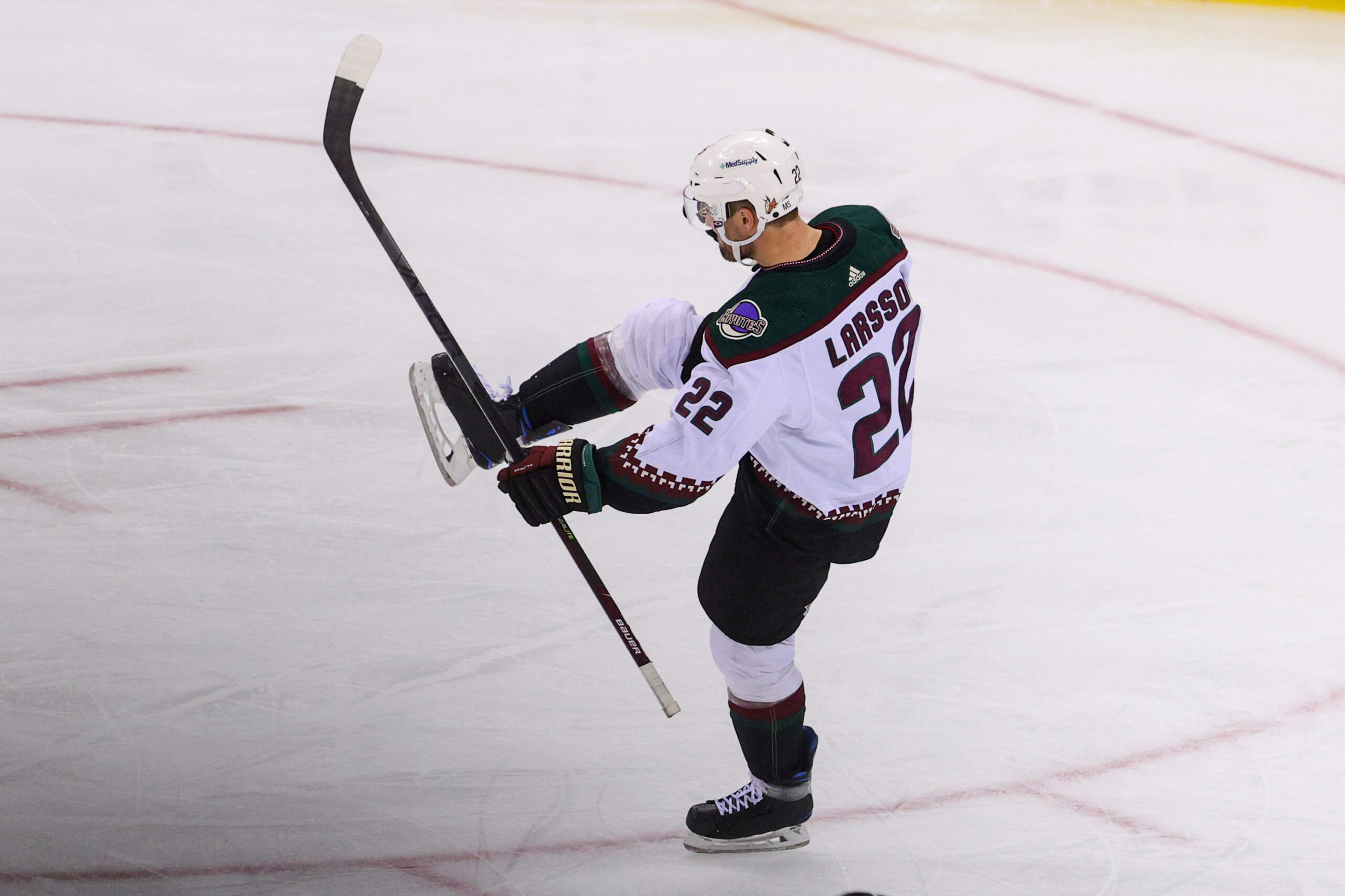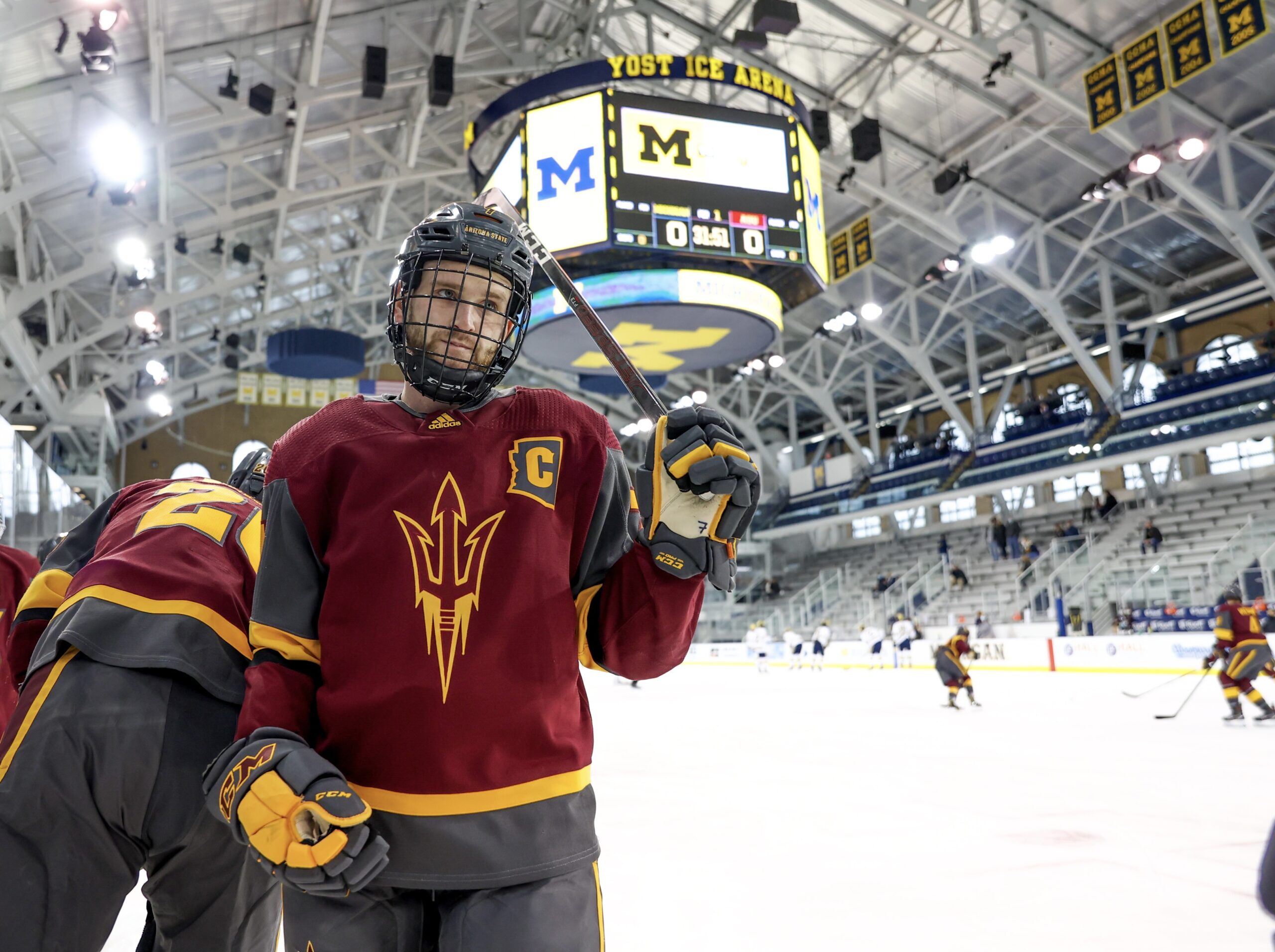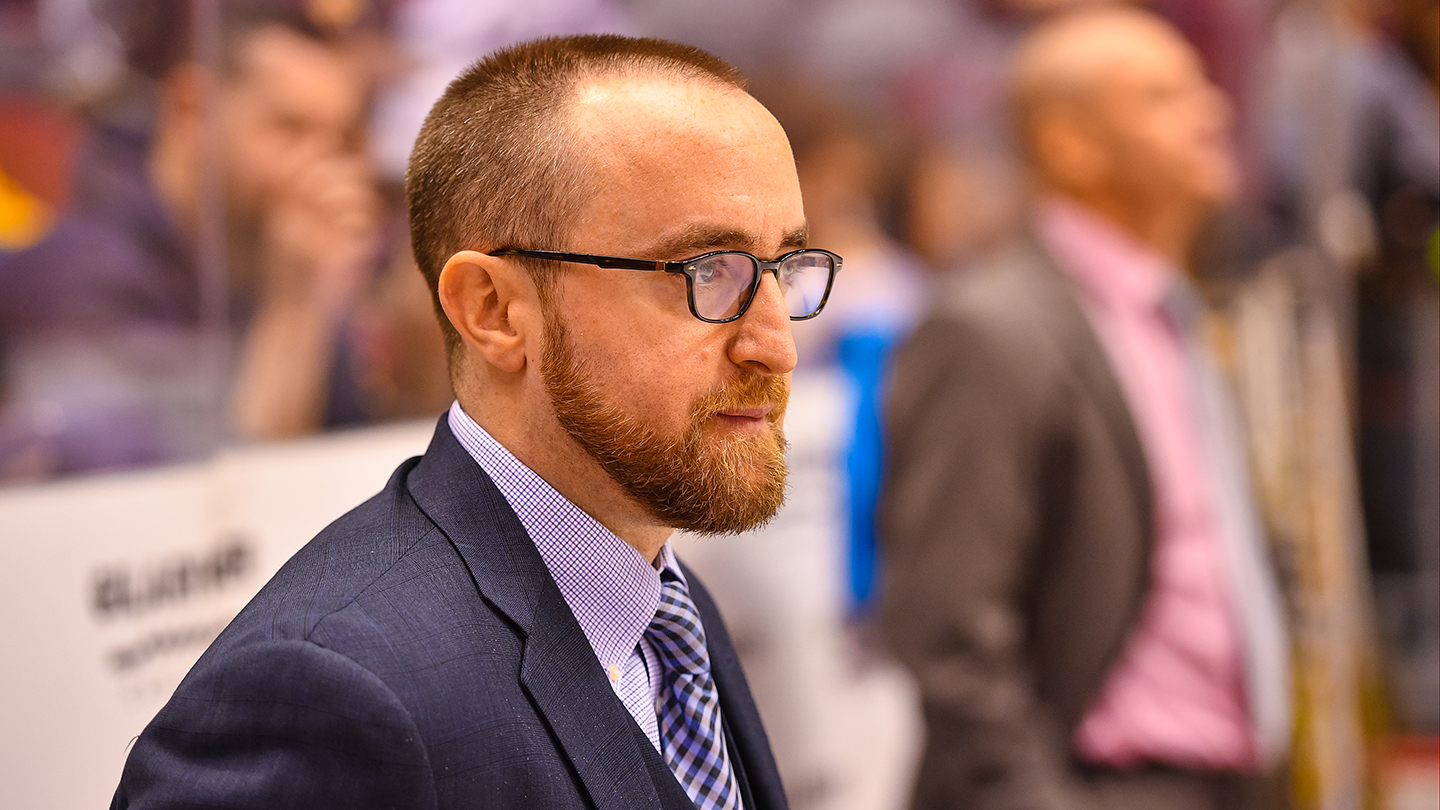© 2025 ALLCITY Network Inc.
All rights reserved.

With two more games played, Coyotes center Barrett Hayton will equal his longest stretch of consecutive NHL games played at 14. With 10 more games played, Hayton will have played 82 career NHL games over the past three seasons; the equivalent of one full season. Over the past three seasons, Hayton has played a total of 115 professional games split between the NHL, AHL and the Finnish SM-Liiga.
Despite those tiny numbers, despite a string of healthy scratches early in his NHL career, despite his globe trotting to find playing time, and despite an assortment of injuries that have sidelined him, whether it was the Grade I shoulder separation that shelved him after the 2020 World Junior Championship or the hand surgery that sidelined him earlier this season, there are analysts and fans who have decided that Hayton is a bust of a No. 5 overall pick in 2018.
There are 17 players from that draft with more points than Hayton, the argument goes. That’s pretty much where the argument stops.
It drives Coyotes coach André Tourigny crazy.
“I talk a lot about that and I was getting a little bit maybe frustrated in the first half of the season; not irritated but a little bit when everybody was talking to me about Barrett Hayton and everybody was talking about his offensive production,” Tourigny said after Hayton scored a goal for the second consecutive game in a 5-3 win in Montréal on Tuesday. “He’s 21 years old. This is his first full season in the NHL and he’s playing every night against Anže Kopitar, Ryan Getzlaf, Connor McDavid, Bo Horvat; he’s playing against the first line every night.
“He takes every face-off in our zone. He plays on the first PK. He had a role where it was really demanding and he was doing a really good job at it, but yes, he was not producing so people were seeing just the stat part.”
When Hayton returned to the lineup from the aforementioned hand injury that sidelined him from Jan. 6 to Feb. 19, GM Bill Armstrong said the plan was to ”get him in a little bit different role and he can jump into that role and produce.”
By dropping Hayton into a third-line center role, the Coyotes removed some of the difficult defensive matchups that he had been seeing on a nightly basis. The result: Hayton has four goals and 10 points in the 12 games since he returned to the lineup, including eight points in his past eight games.
“When he came back we had an opportunity to say, ‘OK, now we’ll use you like you should be,” Tourigny said. “You should have the opportunity to not just go out there and try to survive. Go out there and play hockey and do your thing and you can see the result now. He’s making plays.”
Hayton seems to be thriving on a line with newly acquired Nick Ritchie (five goals, seven points in nine games with Arizona) and Loui Eriksson. The chance to play consistently is also helping; an opportunity that Hayton has rarely been afforded in one of the most disjointed development paths that the franchise has seen in recent years.
“I think I can contribute to a lot of things,” Hayton said. “I like my game. I feel like I’m playing with speed, I’m playing with pace and obviously I’m generating some offense while continuing to play a 200-foot game. I feel like I have been pretty strong in the (face-off) circle as of late. I had a couple of games where I wasn’t great but I have been focusing on that and obviously PK. I’m just trying to play a well-rounded game.”
A 12-game stretch is not a large enough sample to pronounce that Hayton has turned a corner toward becoming the top-6 center the Coyotes envisioned when they drafted him, but by the end of this season, the Coyotes should have a very good idea of what they have in Hayton.

Injury updates
Coyotes GM Bill Armstrong said that he expects injured centers Johan Larsson and Jay Beagle both to return to the lineup right after the Monday NHL trade deadline.
Larsson hasn’t played since undergoing sports hernia surgery that has sidelined him for almost two months. Beagle (undisclosed surgery for a lower-body injury) hasn’t played since Dec. 11. Both players could draw interest at the trade deadline from teams looking to shore up their center depth.
Larsson, 29, a rugged, defensive-minded center who can sustain a forecheck, will be a UFA after this season. He showed some offensive life with six goals and 10 points in his final 12 games before the surgery. Per a source, the Calgary Flames were interested in Larsson before acquiring Calle Järnkrok on Wednesday.
Beagle, 36, has Cup-winning experience (Washington). He brings a responsible defensive game and a lot of leadership qualities to a dressing room. Beagle will be a UFA at the end of the season.

Walker’s opportunity
It was fitting that Johnny Walker scored the game-winning goal in the final ASU game at Oceanside Ice Arena on Saturday. Oceanside is where the Sun Devils’ Division I hockey program was born, and no player meant more to the program’s early success and profile than the Valley product, a five-year letterman.
“Having a local kid come here in what was our extreme infant stage was so important,” ASU coach Greg Powers said. “After he won a (USHL) championship with Chicago, he could have gone to a lot of different places but he stayed true and came here and had success right away.
“I think what it did is it elevated our ability to showcase what we offered, like, ‘Hey, if you’re an elite player and you’re from here, this is where you should go.’ I think it led to us getting kids like Demetrios Koumontzis and Josh Doan who are both from Scottsdale. It helps so much when we can get the local kid to stay and Johnny was our first that did that.”
Coming into his senior season in 2020-21, Walker was the leading returning goal scorer in the nation with 60 goals (96 points) in 100 games. A knee injury hampered him throughout the COVID-impacted 2020-21 season that the Sun Devils were forced to play entirely on the road, and it cropped up again earlier this season, limiting him to 23 games, six goals and 13 points.
Those injuries likely put a damper on his professional opportunities, but as he took to the road on Monday, Walker said he was feeling as healthy as he has felt in a long time as he reflected on his concluded ASU career.
“Being at home for the last game, being at Oceanside made it one of the cooler games of my hockey career,” he said. “It really made me appreciate everything that ASU has done for me, and Powers has done for me, the relationships that I built here and meeting my wife here (former ASU golfer Sofia Anokhina).
“I remember Powers telling me when I was coming in that we would be in the tournament by my sophomore year and I’m thinking, ‘This guy is crazy.’ I was watching the games and the program wasn’t in the best spot. I was like, ‘Maybe we can make a tournament by my senior year,’ but he was absolutely right. Just being able to be a part of it makes me feel so grateful; truly just feel fortunate to have that opportunity to be an ASU hockey player.”
With Powers’ help, Walker signed a contract with the ECHL’s Utah Grizzlies for the rest of the season as he looks to continue his career. He will finish up his masters degree at ASU by May and work an internship this summer. After that, who knows? Walker said he is open to just about every opportunity to keep playing, including going to Europe.

Powers’ plan
Greg Powers and the ASU hockey program didn’t achieve their ultimate goal of getting back to the NCAA Tournament this season. A few key losses on the road prevented the Sun Devils (17-17-1) from ever gaining much momentum, but when he dove into details, Powers identified a need that will occupy much of his offseason.
ASU averaged 3.3 goals per game this season, which ranked 10th in the nation, but it allowed 3.5 per game, which was the seventh-worst mark in Division I.
“We’re going to really dive into team defense and revamping some philosophies and stress the importance of being a tight-checking team,” Powers said. “We’re excited with our recruiting and the guys we’re bringing in on the back end, but we need to focus on keeping the puck out of the net.”
Powers said that he and his staff plan to sit down with some NHL coaching staffs to pick their brains. Among them, Darryl Sutter’s staff with the Calgary Flames.
“I’m a huge fan of what they’re doing,” Powers said. “They’re just so smothering and tight checking and they defend so well. I’d love to hear their philosophy and see how they implement it.
“We’re going to take probably the next month to see if we can spend some time with a few different minds and put something together that works for us.”
The other key offseason change will be finding more consistent goaltending. Sophomore Cole Brady has entered the transfer portal and will not be back. While junior Ben Kraws had some good stretches, but he was not consistent enough.
“You can expect us to bring in a very high caliber goalie to shore up that position and give us a little bit more depth and consistency back there,” Powers said.
In June, the Sun Devils should be able to move into their new, on-campus, multi-purpose arena.
A west-based junior league
For years, budding hockey players in the western United States have complained of the lack of opportunity to continue their careers in the region. There is a sweet spot between the emergence of a player as a mid-teen and his readiness for college hockey that is normally filled by junior hockey. To date, there is no such junior league in the region at a top-tier level. The USHL only spans a region from Ohio to Nebraska; no farther west.
Ben Robert hopes to change that. Robert, a Montréal native who lives in California, recently announced the formation of an elite junior hockey league focused on the western United States. Robert said the plan is to start with six teams and hopefully expand to 12 within the next few years.
“The youth hockey market is outstanding in Los Angeles, Anaheim, San Diego, Arizona, San Jose and now Vegas,” Robert said. “There’s too big of a gap between the NHL and youth hockey in these regions whereby we lose all of our kids and they have to go to the Midwest, Canada, the Pacific Northwest, what have you. It’s time to build an elite league in California, in the west, to further develop kids and keep them at home.”
Four NHL teams — the Los Angeles Kings, San Jose Sharks, Anaheim Ducks and Las Vegas Golden Knights — collectively issued the following statement in support of the venture.
“As the game of hockey continues to enjoy unprecedented growth, this is a significant step forward to not only help retain the top players from many of these areas, but to provide them with the best opportunities and resources to pursue their hockey dreams. We are pleased to help support this new venture and we are excited to see how the league evolves and develops.”
Robert cannot name the teams, cities or areas in which they will play yet, but the willingness of four NHL teams to sign on suggests that those four markets will play a role. Robert said that the league is also talking to prospective owners in Phoenix, San Diego, Sacramento, Salt Lake City and Denver.
“We are doing this for the betterment of junior hockey in the United States and in North America where we want to provide a place where we will invest in players, not only in coaching and skill development, but we want to focus on nutrition, recovery, mental support, tutoring, the college-prep type of work because our goal is to give them a great junior experience but to prepare them for a college experience.”
Funding and ownership groups will be a key component of the league’s hope for success, but Robert is no stranger to the sport. He was president and CEO for Quebecor when the group tried to bring an NHL expansion NHL team to Québec City and he owned the USHL’s Omaha Lancers for 10 years.
“If it’s going to be a Tier I junior league or even Tier II, it’s good for us,” ASU coach Greg Powers said. “We don’t have many places we can get to even on a short flight or a three-to-four-hour drive to go watch players. From a recruiting standpoint, if we can develop a high-level junior A league out west, it’s going to be great for our program.”
Coyotes GM Bill Armstrong doesn’t have many details about the league, but he acknowledged that with exponential growth in participation numbers in the west, there should be a corresponding growth in leagues.
“As long as the distance between the cities isn’t too great it could be good,” Armstrong said. “That’s not the purpose of junior hockey; to spend nine or 10 hours on a bus. That time needs to be spent on development. If they can build a league where the cities are relatively close to each other, why not?”
Loose pucks
- The Coyotes are one of several teams interested in 6-feet-4 Boston College senior center Jack McBain. The Minnesota Wild originally selected McBain in the third round (No. 63) of the 2018 NHL Draft, but he does not want to play for the Wild because he does not feel there is ample opportunity on the Wild’s roster for playing time and a significant role. The Wild were reportedly seeking a second-round pick in exchange for McBain. The Coyotes have five of those in the first half of 2022’s second round, but it is unclear if McBain would want to play in Arizona. While the rebuilding Coyotes might afford McBain greater opportunity than other teams, their unsettled off-ice situation has given some agents pause.
- A second opinion on defenseman Jakob Chychrun’s injured ankle revealed a better prognosis than was officially feared. Chychrun could skate by the end of this week and the timeline for his return is looking closer to two weeks. With Chychrun’s name constantly mentioned in trade-deadline rumors, it’s important to note that it only takes one team to step up and offer what the Coyotes are asking, but there is no urgency to get this deal done. Don’t be surprised if the Chychrun trade talk gets tabled until the NHL Draft when Arizona has 31 potential suitors instead of a handful that limits its trade options.
Follow Craig Morgan on Twitter
Comments
Share your thoughts
Join the conversation



